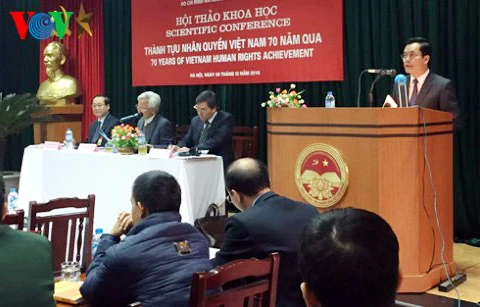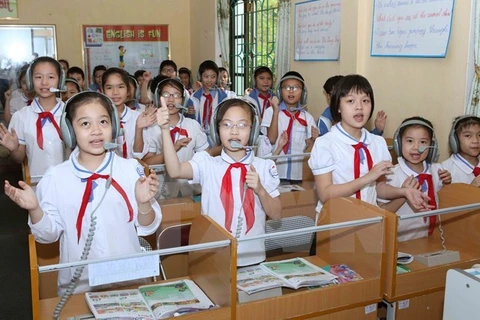Hanoi (VNA) – Vietnam steadfastly pursues the policy of ensuring full enforcement of basic rights and freedom for each citizen, Deputy Foreign Minister Ha Kim Ngoc has written in an article on the occasion of World Human Rights Day.
Under this policy, Vietnam has been expanding international human right cooperation and carrying out its international commitments on human rights in a serious and open manner, the deputy FM said.
Vietnam is currently engaged in official human rights dialogue mechanism with five partners, including the US, the European Union, Switzerland, Norway and Australia, not to mention other unofficial relevant channels. The country has become more active in multilateral forums on human rights in its capacity as a member of the UN Human Rights Council.
Joining international treaties and realising commitments on human rights are one of the key tasks Vietnam has set, with a view to meeting basic and universal standards on human rights and incorporating globally-recognised regulations into Vietnam’s human rights laws in a way that suits the country’s specific situation.
Vietnam has joined seven out of nine essential international treaties on human rights. In particular, the country was the second in the world and the first in Asia to become a member of the Convention on the Rights of the Child.
Early this year, Vietnam ratified the Convention on the Rights of Persons with Disabilities and the Convention against Torture. The country also participated in 20 conventions on labour rights initiated by the International Labour Organisation (ILO), including five out of eight core conventions, which shows its high commitment despite the socio-economic difficulties.
Vietnam’s efforts are not only shown in the number of international human rights conventions to which it is a member but also the high sense of responsibility for enforcing them, including integrating the conventions’ content into domestic laws, raising public awareness of their contents on the mass media and school curricula, and seriously fulfilling compulsory obligations to build and submit national reports. The country has submitted a total of 16 reports to the Committees on human rights conventions.
Vietnam first deployed the UN Human Rights Council’s universal periodic review (UPR) mechanism in May 2009 and accepted 96 out of 123 recommendations. During the second UPR in February 2014, Vietnam accepted 181 out of 227 recommendations, which is a high rate of acceptance of recommendations.
The country drafted its reports in a scrupulous manner, and is serious about implementing the accepted recommendations.
According to Deputy FM Ngoc, the Prime Minister recently approved a master plan on implementing 182 recommendations and the Foreign Ministry is assigned the coordinator for the plan’s execution.
The diplomat noted that through international cooperation, Vietnam is acquiring an increasingly active role in and contributing greatly to the building of values of human rights in general on the regional and global scale, which is in line with its external relation orientations of becoming an active and responsible member in the process of shaping common regulations and standards.
Vietnam’s contributions are reflected in its approach that upholds dialogues and constructive cooperation to narrow differences and avoid confrontations in human rights issues. The country also supports a comprehensive and balanced approach to rights and harmonising individual rights with collective rights, which is clearly demonstrated in Vietnam’s involvement in the UN multilateral mechanisms and the ASEAN frameworks on human rights.
Countries worldwide have welcomed Vietnam’s efforts in joining and seriously abiding by international conventions, UPR recommendations and thorough preparations for devising and presenting national reports.
Several developing countries want to learn from Vietnam’s experience, and many others consult Vietnam when dealing with complicated and sensitive human right issues.
Despite the above achievements, Vietnam still meets obstacles in pooling resources, particularly experts in human rights; enforcing convention obligations, and coordinating activities among agencies.
In the coming time, Vietnam is set to continue seriously fulfilling international human rights obligations while considering joining more international treaties in the field. The country will work more proactively at human rights forums in general, and at UN agencies in which Vietnam will serve as a member in the time ahead such as the UN Socio-Economic Council for 2016-2018, the UNESCO Executive Board for 2015-2019, and in ASEAN mechanisms.
It will also increase collaboration and consultations to ensure the efficiency of enforcing conventions and UPR recommendations, pay more attention to improving the pace and quality of national reports, consider the possibility of building a data archive on human rights and improve the training of human resource for the field, including introducing competent Vietnamese nationals to join Committees on human rights conventions.
The reality shows that Vietnam still needs to greater efforts to deliver on its commitments and international treaties on human rights. With efforts made by ministries and agencies over the past decades, there are good reasons to believe that Vietnam will make more positive contributions to common values of human rights on both regional and global scale, the deputy FM said in conclusion.-VNA

























